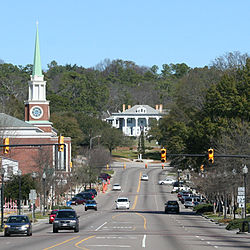North Augusta, SC
| North Augusta, South Carolina | ||
|---|---|---|
| City | ||

Downtown North Augusta
|
||
|
||
| Motto: "South Carolina's Riverfront" | ||
 Location of North Augusta, South Carolina |
||
| Coordinates: 33°30′47″N 81°57′46″W / 33.51306°N 81.96278°WCoordinates: 33°30′47″N 81°57′46″W / 33.51306°N 81.96278°W | ||
| Country | United States | |
| State | South Carolina | |
| Counties | Aiken, Edgefield | |
| Area | ||
| • Total | 20.5 sq mi (53.1 km2) | |
| • Land | 20.0 sq mi (51.9 km2) | |
| • Water | 0.5 sq mi (1.2 km2) | |
| Elevation | 387 ft (118 m) | |
| Population (2010) | ||
| • Total | 21,348 | |
| • Estimate (2016) | 23,110 | |
| • Density | 1,066/sq mi (411.5/km2) | |
| Time zone | Eastern (EST) (UTC-5) | |
| • Summer (DST) | EDT (UTC-4) | |
| ZIP codes | 29800-29899 | |
| Area code(s) | 803 | |
| FIPS code | 45-50695 | |
| GNIS feature ID | 1231597 | |
| Website | www |
|
North Augusta is a city in Aiken and Edgefield counties in the U.S. state of South Carolina, on the north bank of the Savannah River. The population was 21,348 at the 2010 census. The city is included in the Central Savannah River Area (CSRA) and is part of the Augusta, Georgia metropolitan area.
North Augusta is located on the Fall Line along the Savannah River, across from Augusta, Georgia. Three earlier towns have stood in the same general area. The English established a trading post known as Savannah Town over 300 years ago. This town was abandoned when Augusta proved to be more prosperous and attractive to traders. Campbelltown was established by John Hammond as a trading point for tobacco and Indian traders over 200 years ago. Again, competition, sometimes violent opposition, from the Georgia side of the Savannah River, coupled with a recession in the tobacco market spelled the end of Campbelltown in the early 19th century.
With the explosion of the cotton economy, this area became an important market for the increasingly valuable produce of planters throughout upper Georgia and South Carolina. In 1821 the town of Hamburg was established by the mechanical genius and entrepreneur Henry Shultz in direct commercial competition with Augusta. In 1833 the South Carolina Rail Road was established, further connecting the cotton collected at Hamburg to the seaport of Charleston. The 1848 construction of the Augusta Canal channeled produce from upriver away from Hamburg. When a bridge linked the South Carolina Rail Road to Augusta allowing traffic to bypass the doomed town of Hamburg, white citizens began to move out of the town, being replaced by blacks after the Civil War. The final blow came in 1876, when a white mob attacked and looted the primarily black town, taking and executing several prisoners, while also wounding several others and attempting to kill the town's elected representatives. Henry Shultz died in poverty and reportedly is buried upright on the bluff overlooking Hamburg with his back to Augusta.
...
Wikipedia

